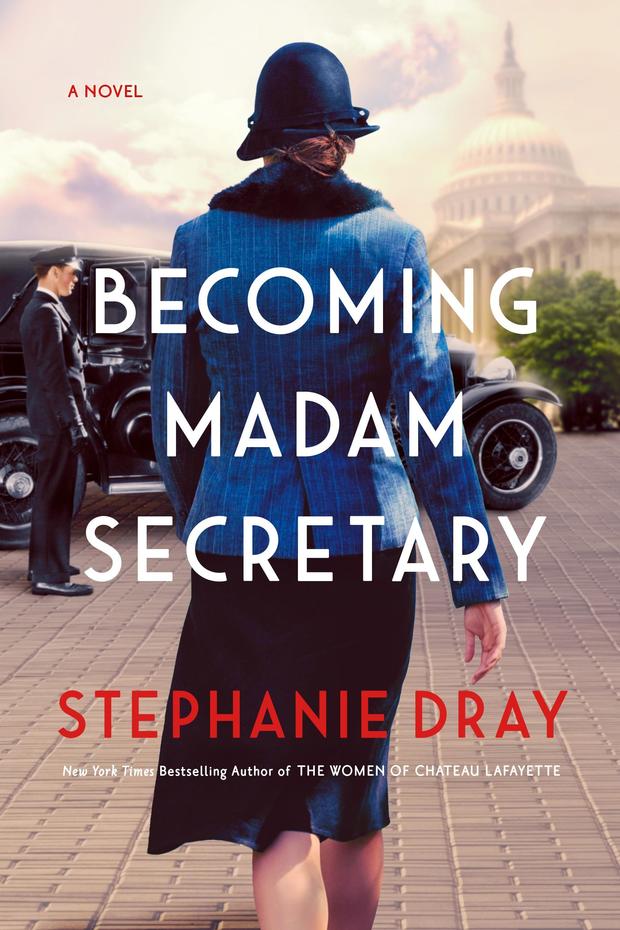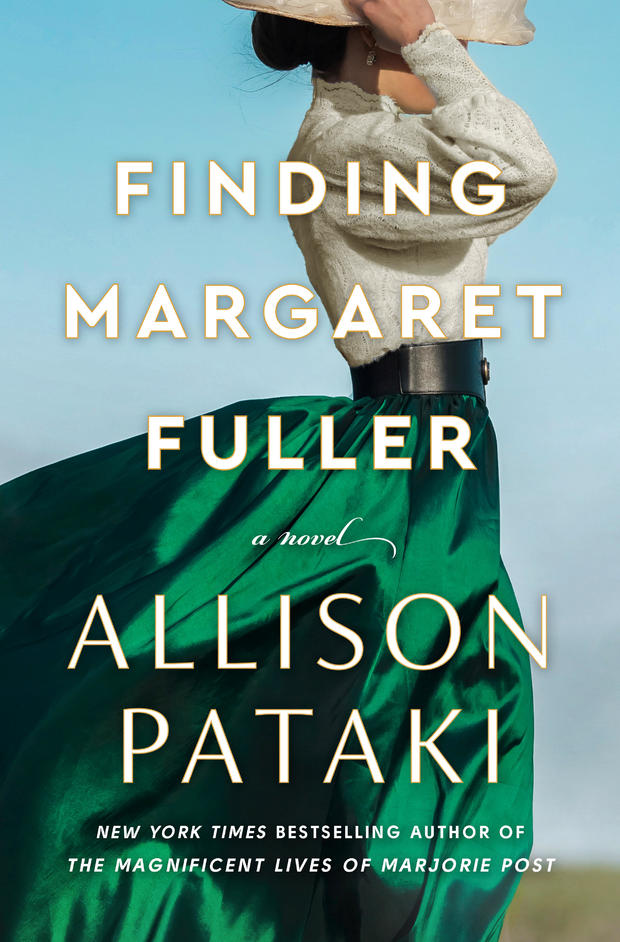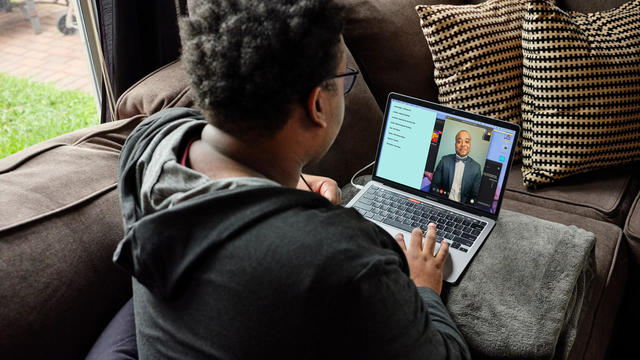#ClubCalvi, voting has closed for the next read
Please consider joining our Facebook group by CLICKING HERE.
This content is sponsored by Cohen's Fashion Optical.
Find out more about the books below.
#ClubCalvi, it's time to select our next Readers' Choice book
Three women who are navigating challenging lives during challenging times with determination, empathy, courage, and humor take center stage in our Top 3 FicPicks. They include a novel set in present day, and two books of historical fiction, including one set in the 1800s and the other in the 1900s.
It's time for you to vote on which book the CBS New York Book Club will read for the next month.
Your choices are: "Becoming Madam Secretary" by Stephanie Dray, "Finding Margaret Fuller" by Allison Pataki, and "Sylvia's Second Act" by Hillary Yablon. These books may have adult themes.
Read the excerpts below.
Voting closed at 6 p.m. on Sunday, March 24. We will reveal the Readers' Choice on Tuesday, March 26.
Prefer to listen? Audible has a 30-day free trial available right now.
"Becoming Madam Secretary" by Stephanie Dray
From the publisher: Raised on tales of her revolutionary ancestors, Frances Perkins arrives in New York City at the turn of the century, armed with her trusty parasol and an unyielding determination to make a difference.
When she's not working with children in the crowded tenements in Hell's Kitchen, Frances throws herself into the social scene in Greenwich Village, befriending an eclectic group of politicians, artists, and activists, including the millionaire socialite Mary Harriman Rumsey, the flirtatious budding author Sinclair Lewis, and the brilliant but troubled reformer Paul Wilson, with whom she falls deeply in love.
But when Frances meets a young lawyer named Franklin Delano Roosevelt at a tea dance, sparks fly in all the wrong directions. She thinks he's a rich, arrogant dilettante who gets by on a handsome face and a famous name. He thinks she's a priggish bluestocking and insufferable do-gooder. Neither knows it yet, but over the next twenty years, they will form a historic partnership that will carry them both to the White House.
Frances is destined to rise in a political world dominated by men, facing down the Great Depression as FDR's most trusted lieutenant—even as she struggles to balance the demands of a public career with marriage and motherhood.
Stephanie Dray lives in Maryland.
"Becoming Madam Secretary" by Stephanie Dray (Hardcover) $26
"Becoming Madam Secretary" By Stephanie Dray (Kindle) $15
"Finding Margaret Fuller" By Allison Pataki
From the publisher: Young, brazen, beautiful, and unapologetically brilliant, Margaret Fuller accepts an invitation from Ralph Waldo Emerson, the celebrated Sage of Concord, to meet his coterie of enlightened friends. There she becomes "the radiant genius and fiery heart" of the Transcendentalists, a role model to a young Louisa May Alcott, an inspiration for Nathaniel Hawthorne's Hester Prynne and the scandalous Scarlet Letter, a friend to Henry David Thoreau as he ventures out to Walden Pond . . . and a muse to Emerson. But Margaret craves more than poetry and interpersonal drama, and her restless soul needs new challenges and adventures.
And so she charts a singular course against a backdrop of dizzying historical drama: From Boston, where she hosts a salon for students like Elizabeth Cady Stanton; to the editorial meetings of The Dial magazine, where she hones her pen as its co-founder; to Harvard's library, where she is the first woman permitted entry; to the gritty New York streets where she spars with Edgar Allan Poe and reports on Frederick Douglass. Margaret defies conventions time and again as an activist for women and an advocate for humanity, earning admirers and critics alike.
When the legendary editor Horace Greeley offers her an assignment in Europe, Margaret again makes history as the first female foreign news correspondent, mingling with luminaries like Frédéric Chopin, William Wordsworth, George Sand and more. But it is in Rome that she finds a world of passion, romance, and revolution, taking a Roman count as a lover—and sparking an international scandal.
Allison Pataki lives in New York.
"Finding Margaret Fuller" by Allison Pataki (Hardcover) $23
"Finding Margaret Fuller" by Allison Pataki (Kindle) $15
"Sylvia's Second Act" by Hillary Yablon
From the publisher: When 63-year-old Sylvia finds her husband in bed with the floozy of their Boca retirement community, she's shocked and furious . . . at first. By the time her head stops spinning, Sylvia realizes that actually, this isn't what she wants anymore anyway.
So she enlists her best friend, the glamorous older widow Evie, to join her in setting up a new life in Manhattan. Sylvia's ex-husband may have lost her life savings, but Sylvia and Evie are scrappy and determined, unopposed to pawning jewelry and roughing it in tiny apartments. And before long, Sylvia signs on to revive her decades-old wedding planning business with a former professional rival. Sylvia has a lot to prove, and beneath it all, she can't help but wonder: Will she ever be able to get back into the dating game?
Sylvia doesn't want to be twenty-five or thirty again. Her age gives her wisdom, experience, and perspective. A career, sex, fun, and a new romance—her entire second act is stretched out in front of her, beckoning to her. It's her time, and watch out, world, Sylvia is coming!
Hillary Yablon lives in Los Angeles.
"Sylvia's Second Act" by Hillary Yablon (Hardcover) $23
"Sylvia's Second Act" by Hillary Yablon (Kindle) $15
Excerpt: "Becoming Madam Secretary" by Stephanie Dray
Chapter One
New York City
Summer 1909
My family built this country with muddy hands and a spark of madness. On my grandfather's side, we were brickmakers, shoveling clay out of pits along the Damariscotta River in Maine. On my grandmother's side, we were rebels, writing pamphlets against taxation without representation and taking up muskets against the redcoats.
Alas, just like some bricks break in the kiln, so, too, did some of my kin crack in the fire of the American Revolution. Madness runs in families, they say. Courage too. And I wasn't entirely sure which of those inheritable traits was most responsible for my decision as a young woman to move to New York City, where I'd be living in Hell's Kitchen, one of the most notoriously violent tenement slums.
The neighborhood-insofar as one could call it that-was so much under the thumb of gang leaders that policemen couldn't enter without fear of being pelted with stones by lookouts who then escaped down the drainpipes into a maze of rat-infested back alleys.
Yet here I was-with my lace parasol in one hand, traveling valise in the other-jostling past shabby storefronts with soot-stained awnings, noisy saloons selling three-cent whiskey, and a rogue's gallery of ruffians brandishing penknives, looking to separate me from my valuables.
Fortunately, I hadn't any valuables on my person unless one were to count my fashionably ornamented hat and the few pennies I hid in my lace-up boot.
No doubt, I made a curious sight in the tenements, where strangers stood out. I also had an unfortunate moon face with dimples that gave the impression of doe-eyed youth even though I was twenty-nine years of age. And because my previous employment at the Philadelphia Research and Protective Association hadn't afforded a salary generous enough to pay for more than the occasional banana sandwich, I was thin enough to sometimes be confused with a teenaged girl.
But I wasn't a lost little naïf. I had learned from hard-won experience that in places such as this-where the foul odors from the docks mixed with the smell of horse dung and unwashed humanity in the streets-it was best to stride with a purposeful gait, keeping fixed upon my face an expression that said, Ill-intended gentlemen will very much regret trifling with me.
I'm convinced that stride and expression are all that account for how I arrived unmolested at the tall wrought iron stairway entrance of the brick settlement house on West Forty-Sixth Street.
Amid surrounding squalor, the settlement house was surprisingly well kept, its front stoop graced with pots of scarlet chrysanthemums. This place was meant to be a sanctuary for the poor where they could bathe, seek nursing care, or attend classes. And no sooner had I approached that sanctuary than did the curious, cold, and calculating looks I got on the street melt into something a little more civilized.
When I rang the bell, the supervisor was waiting for me. She introduced herself as Miss Mathews and ushered me inside while scrutinizing my fashionably narrow skirt with a whiff of disdain.
The dour-faced Miss Mathews was herself dressed all in black like social agitators of the older generation, adhering to the S-shaped corset. And I noticed her manner was just as constrained when she sniffed and said, very stiffly, "Welcome to Hartley House, Miss Perkins."
"Thank you," I chirped cheerfully, taking in the lovely foyer, then following her into a little office, where I sat at the edge of my seat, gloves folded in my lap, the heels of my lace-up boots lined up primly as she reviewed my file. "I'm very much looking forward to my time here at Hartley House."
"You come to us highly recommended," she said, as if she couldn't possibly imagine why. "And I see you have a fine education. Mount Holyoke College. Wharton Business School. And now New York's School of Philanthropy. Our understanding is that you're here on a fellowship from the Russell Sage Foundation."
"Yes," I said. "I've been given the opportunity to pursue a master's degree in economics, and I intend to make a survey of child malnutrition for my thesis."
Her eyes narrowed over the top of the file. "Not many women go to college, much less graduate school. Unless they are quite wealthy. Are you an heiress to a family fortune, Miss Perkins?"
In what I hoped was a crisply professional manner, I replied, "No, but my father owns a stationery store on Main Street in Worcester, Massachusetts, if you've ever been. Perkins & Butler Paper and Twine."
"I haven't had the pleasure."
Of course she hadn't. And it wouldn't have mattered if she had. Because my family's brickmaking business dwindled before I was born, forcing my father to stray from the family homestead in Maine in pursuit of middle-class mercantile respectability. But we still had the land and the legends . .
Before my beloved grandmother passed, she regaled me with tales of our family's fiery revolutionaries and abolitionists. James Otis. Mercy Otis Warren. Oliver Otis Howard. With such relations, was it any wonder I had set forth like a vagabond patriot bent on improving the world?
Clearing my throat, I explained, "I sought an education because it's a point of family pride to have learned women. You see, we are kin to the first female scholar in Revolutionary America."
Did I imagine that Miss Mathews was at least a little impressed? "Well, then, it seems you are a young lady of good breeding, but young ladies of good breeding pass through every day. They come for idle curiosity about the poor. Or to rebel against their parents. Or to mark time before marriage, after which we never see them again."
"I assure you that I am not marking time before marriage."
Miss Mathews closed my file. "Why not? Aren't your parents expecting you to marry respectably?"
My parents had, in fact, expected me to do just that, and despite my protestations, my mother continually pressed suitors upon me. But I chuckled and said, "Fortunately, my younger sister has fulfilled family expectations by becoming betrothed to a dentist in Worcester, so I consider myself off the hook and decidedly on the shelf."
Miss Mathews now seemed vaguely amused. "Aren't you interested in finding love, Miss Perkins? In marrying and starting a family of your own? You seem to be a pleasant enough young woman with the sort of dimples that might attract beaus."
I decided to ignore both my own frustrated desires and the slight mockery in her tone. "I'm not as young as I look. What's more, I believe God has called me to better the lives of my countrymen. I could never allow romantic love to obliterate my responsibility to love mankind."
From BECOMING MADAM SECRETARY published by arrangement with Berkley, an imprint of Penguin Random House LLC. Copyright © 2024 by Stephanie Dray
Excerpt: "Finding Margaret Fuller" By Allison Pataki
Chapter One
Concord, Massachusetts
Summer 1836
I know that Mr. Emerson is expecting me. It was he, after all, who invited me here. And yet, as I approach the front door of his grand white home, I feel a twinge of nerves. I pause, staring up at the house, an imposing structure set back from the Cambridge Turnpike, hemmed by a fence, the columned porticoes and rolling green lawns lending the place a simple, stately elegance. "Bush" is what Mr. Emerson called the estate in his letters, when he wrote to invite me from Cambridge out to the country for a week's visit.
He'd read my newspaper tribute, Mr. Emerson explained, to his beloved brother Charles, so recently deceased of tuberculosis. He'd found that my words had touched his heart, providing some small balm to the pain of the untimely loss. I was a young writer of great promise, Mr. Emerson declared, his fine cursive filling the front and back of the page. As one of New England's most established lecturers and perhaps its most prolific writer, he, Mr. Ralph Waldo Emerson, took great pride in being able to support individuals like me. Even women, his words implied, though he had not stated that outright. But really, he hastened to add, the primary purpose of the visit was to provide companionship for his wife, Mrs. Lidian Emerson, now in the final months of her confinement before the expected arrival of their first child, and barely able to leave her bed.
"He's collecting friends and thinkers to his side," Eliza Peabody had told me, when she welcomed me into her Boston parlor for tea on the eve of my planned departure. Eliza, my friend of several years, and I had gravitated toward each other as two of the only young ladies in the Boston and Cambridge writing circles who shared the twin stains on our reputations of being unwed and wishing to work as published writers. We had an audacity to us that frightened many, an independence of spirit and circumstance that made us not a little bit threatening to some of the men who wrote about freedom and lectured about liberty. An independence that allowed me to accept an invitation such as this one from Mr. Emerson, to stay as his houseguest in the country.
Eliza was in a position to tell me what I might expect from a visit at Emerson's estate, as she herself had made the very same three-hour journey by stagecoach from Boston to Concord on more than one occasion to accept a similar invitation—or was it a summons?— to the Emerson home.
"He knows of you, Margaret. Knows your reputation, evidently even knows some of your writing," Eliza said, stirring a pinch of sugar into her tea as she held me with her intense, inquisitive gaze. I did my best to bite back the flattered smile that pulled on my lips. To think, my work had been read—and enjoyed—by a man such as Ralph Waldo Emerson. Certainly there were many who found my work and my passions unladylike, even unnatural. But not Mr. Emerson, it seemed.
Eliza went on: "Sophia and I were with the Emersons out at Bush in the spring." While Eliza was a celebrated wit and lady of letters, her sister Sophia was known to excel at painting. "It promises to be interesting, my dear, to say the least. A chance to glimpse the great Sage of Concord at home."
And now here I stand, clutching my cloth bag and gazing at the front door of Mr. Ralph Waldo Emerson's home. I glance down at my dress, a simple poplin of dove gray, a cream-colored kerchief tied modestly around my neck. I pat the skirt and then raise my gloved hands to make certain that my chestnut bun is tidy, the curls bobbing down the nape of my neck, giving myself one final prink before I knock.
I'm expecting a servant of some sort, perhaps a housekeeper or cook, but the man who greets me at the door is none other than Mr. Ralph Waldo Emerson himself—I know his famous face. "Oh, yes, Mr. Emerson?" I shift my bag from one hand to the other, forcing a bright tone even as I feel my cheeks grow warm. "Hello."
Mr. Emerson looks at me, one corner of his mouth tilting upward, the hint of a half smile, and then he extends a hand in greeting. "And this must be the famous Margaret Fuller of Cambridge at my doorstep?"
I take his outstretched hand and let out a puff of breath that sounds like a warble. I'm struck by the deep timbre of his voice, and by his informal manner—I hadn't expected either. Already he's caught me back on my heels, so I square my shoulders and summon a casual smile as I reply: "I don't know about famous, but I am Margaret Fuller indeed."
His smile grows from partial to full as his blue-gray eyes catch a lively glimmer. And then he sweeps his arm up, performing a slightly theatrical bow. "Welcome to Concord. Please, Miss Fuller, won't you come inside?"
I accept his welcome and step past him, out of the warm summer afternoon and into the cool and airy quiet of the Emerson home. The foyer is bright and high ceilinged, with a gracious stairway and wooden banister before us and spacious rooms off to each side. I stand still as my host asks after my journey and I tell him it went smoothly. There is neither sight nor sound of any other person in the home, which lends the handsome place an almost temple-like tranquillity. I clutch my valise as Mr. Emerson ushers me across the front hall and into a room lined with books. His study, I suppose. A large mahogany desk occupies pride of place, topped with a tidy stack of papers and a pen tipped into a dish shaped like a bird. Beside it sits a half-filled inkwell. The room smells of books and firewood.
Mr. Emerson stands beside his desk. "What refreshment can I offer you, Miss Fuller, after your hours-long journey? Some tea? Coffee? Water? Ah, or we do have some nice cider which our dear handyman has pressed for us."
"Water would be fine," I answer. As he pours us two cups from a pitcher on a nearby side table, I take the opportunity to subtly study his appearance. Ralph Waldo Emerson is tall and slender, dressed in a tidy suit with a cravat that hugs high and tight around his neck. I know from his reputation as a great speaker and writer that Mr. Emerson is a few years older than me, thirty-three to my twenty-six. Nevertheless, he has an undeniably youthful vitality about him; perhaps someone so filled with deep thoughts and ideas cannot help but overspill with an uncoiled sort of energy.
"Thank you." I accept the water from his hand and take a sip. Our eyes lock for a moment and I allow my stare to linger in his cool gaze, before I remind myself to look away. I take another sip, my throat feeling dry, and I tell myself it's because of the three hours on the turnpike.
Excerpted from Finding Margaret Fuller by Allison Pataki. Copyright © 2024 by Allison Pataki. All rights reserved. No part of this excerpt may be reproduced or reprinted without permission in writing from the publisher.
Excerpt: "Sylvia's Second Act" by Hillary Yablon
One
I admit it. I have fantasies. Of course I do. Who doesn't?
If I were to make a list of my own fantasies, the ones that pop into mind would be the following:
To be a runner. I turned sixty‑three last month; I'm sure my body would be in for quite the shock. But, boy, would I just love to wake up and pull on a pair of those adorable running shorts I see the girls in these days. I actually thought about getting into it after my daughter, Isabel, joined the cross‑country team in high school. I thought we'd go for mother‑daughter runs, but somehow things were always too busy. Izzy had a million activities. I was always in the car, driving her somewhere, like all the other Connecticut housewives.
I used to fantasize about leaving Connecticut. Even just for a night. Taking the train into Manhattan and trying one of those "hot new places" people were always taking about. Having a glass of wine at the bar and then . . .
Okay, the truth is that I fantasized about that almost every day after Izzy left for college. Now I fantasize about going back there and leaving this dreadful Florida retirement community my husband, Louis, insisted we move to. Boca Beach Gables, BBG for short. Don't get me wrong. It's very nice. Very pretty, very upscale, very pink. But I hate the sun. I hate the humidity. I hate the way the days feel stretched out and empty. I have never felt so alone.
I fantasize about what it would have been like if, instead of marrying my husband right after college, I'd had a career abroad, somewhere vibrant. Like London.
I fantasize about taking a bat and swinging it in Belinda Teller's Botoxed face. That may be because Belinda is currently sitting on top of my husband with no clothes on. She is facing me. Because I am an avid fan of Sex and the City (I've seen it from start to finish six times), I know that Belinda is in reverse cowgirl position.
For a moment, I fantasize I'm in reverse cowgirl with Marcus, our spin instructor. That's the best thing I can say about BBG—their staff is excellent. Marcus is gorgeous. I pretend I don't know how to adjust the bike seat so he'll help me. I can almost feel his hands on my lower back right now . . .
S***. I must have gotten caught up in this fantasy because I don't hear Louis and Belinda trying to get through to me.
". . . Sylvia!" Louis is calling. "Jesus Christ, Sylvia! Say something." But I'm frozen. I can't move my mouth. So instead, I look to the left and catch my reflection in the mirror above the dresser. To be honest, I think I look quite good. As much as I hate it, the Florida sun has given my fair skin some color. And I've just gone to the hairdresser. She convinced me to go a little more beachy and added highlights to my shoulder‑length hair.
I'm wearing the linen pants and cotton blouse ensemble that has become my uniform down here. I keep telling myself it's classy and functional but deep down I feel boring and frumpy. I love clothes. But there's something about shopping in South Florida that makes me feel old. Like I'm one step closer to white sneakers and track pants.
I run a hand through my hair and frown. Where was I? Right. I'm standing in the bedroom of my ocean view condo staring at Belinda Teller's naked body. She is now sitting on the bed next to my husband instead of on top of him. Louis has the sheets around himself.
Typical. He's always been selfish.
"Oh my god, Sylvia. This isn't what you think," Belinda says as she shivers a bit.
"Oh, that's a relief," I say. "Because I thought you were having sex with my husband. But maybe you're just playing bridge. Only with no clothes. And no cards."
Belinda blinks. I can't stop staring at her enormous boobs. They're quite perky and, from what she told us at last month's Ladies' Wine Night, freshly redone by the best surgeon in South Florida.
"How long are you planning to sit there naked?" I ask.
"It's just . . . I'm so sorry, Sylvia. But would you mind?" Belinda's voice trails off and I follow her eyeline and look down. I'm standing on her bra. Instinctively, I bend down and pick it up. It looks like a small tent. I toss it to her.
"Thanks," Belinda says as she puts on the bra. Naturally, it's sheer, and somehow her nipples look even bigger beneath the black lace.
"You do the Brazilian?" I have no control over what comes out of my mouth. It gets worse in stressful situations. Plus, Belinda is now standing up and I have a full frontal view. "I ask because I was watching the episode of Sex and the City where Carrie can't decide what she thinks of men who want a completely bare p****."
Louis looks positively scandalized. "Sylvia!"
"What? I can't say p****? You're the one having sex with a woman you know I hate."
"You hate me?" Belinda looks surprised. "I thought we were friends." I want to hit her. But instead, I glare. "Get out."
"You're right! I'm sorry! I just, um . . . I just don't know know where my clothes are."
Of course she doesn't. As if on reflex, I drop to my knees and start looking under the bed for her clothes.
Louis crouches down next to me. "Sylvia." He swallows. "I'm so sorry. You don't have to do this."
"Just help me find her damn clothes." My voice is muffled as I flatten myself on my stomach and squirm farther under the bed.
Louis sighs and gets up. From my vantage point, I see his and Belinda's feet padding around the room. "Louis," Belinda whispers. I don't hear what else she says, but I see Louis's feet leave the room. It's dark under the bed. The carpet is gunmetal gray—hardly my first choice—and I can barely see anything. My arms are outstretched and I'm swimming them slowly over the floor. My hands finally hit something that is lacy and obscenely small. "I think I've found your underpants," I call as I slither back out from under the bed.
Before getting up, I glance over my shoulder. The coast is clear. I covertly turn Belinda's thong inside out so I can see the label printed on the waistband. Size zero.
That b****.
I drag myself to my feet and hand Belinda her panties. "All right. Now get out."
Belinda pulls them on and nods. "I just need my dress. Or if you want me gone, maybe I can borrow something of yours?"
"We both know my clothes won't fit you."
"Don't be silly! We're practically the same size."
"I'm six inches taller and thirty pounds heavier." My voice is flat. Belinda waves a hand as though we're just girlfriends at lunch fishing for compliments. "You've got a gorgeous figure. I'd die to be tall and athletic like you."
She's lying. She loves being tiny and feminine. I am sick with jealousy over her flat stomach. The last thing I need to see is her swimming in my clothes. And I'd sooner die than watch her walk out in one of Louis's big T‑shirts like this was some frat house.
Excerpted from SYLVIA'S SECOND ACT by Hillary Yablon. Copyright © 2024 by Hillary Yablon. All rights reserved. No part of this excerpt may be reproduced or reprinted without permission.











